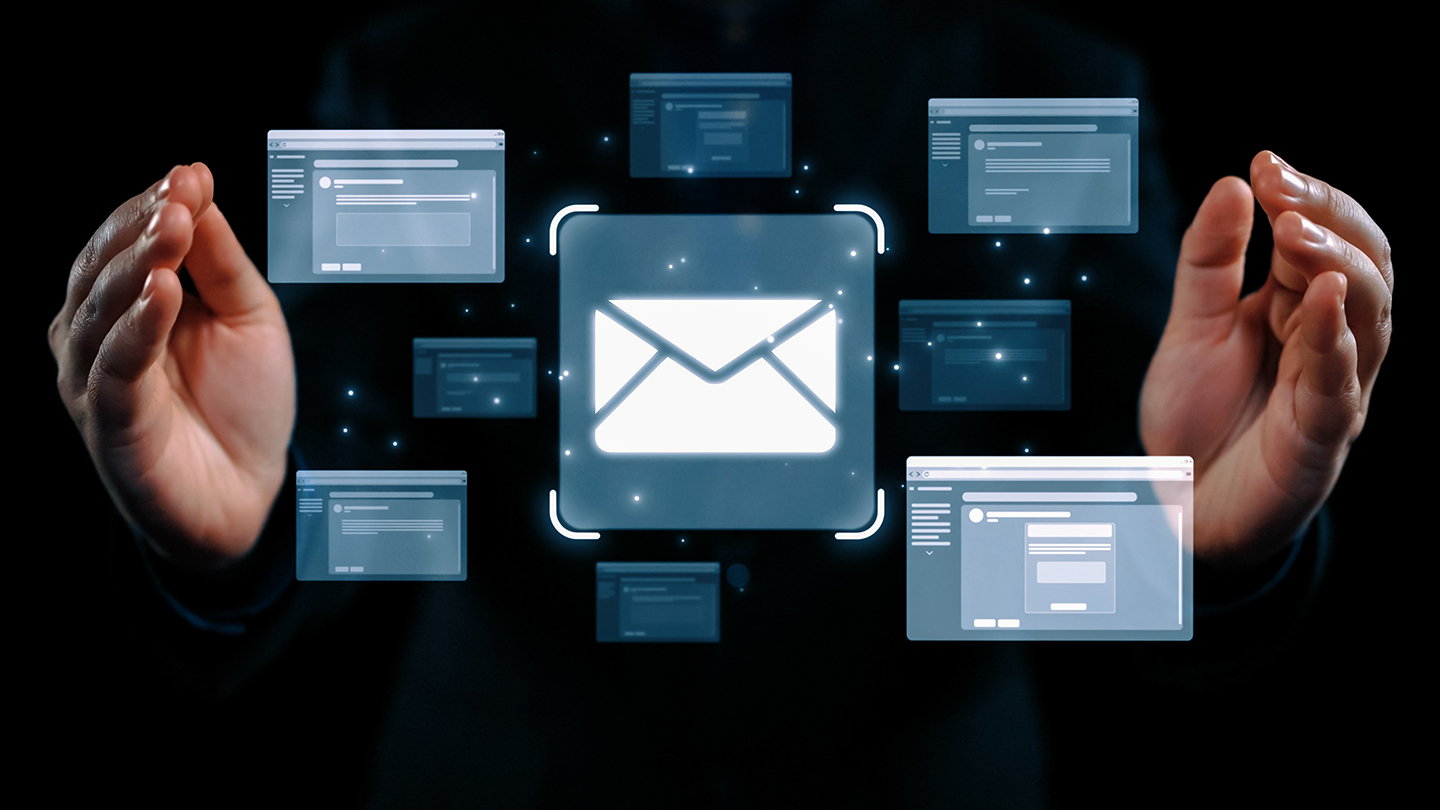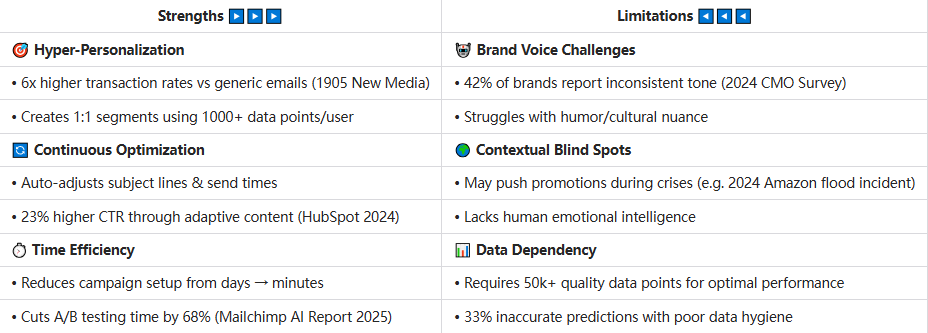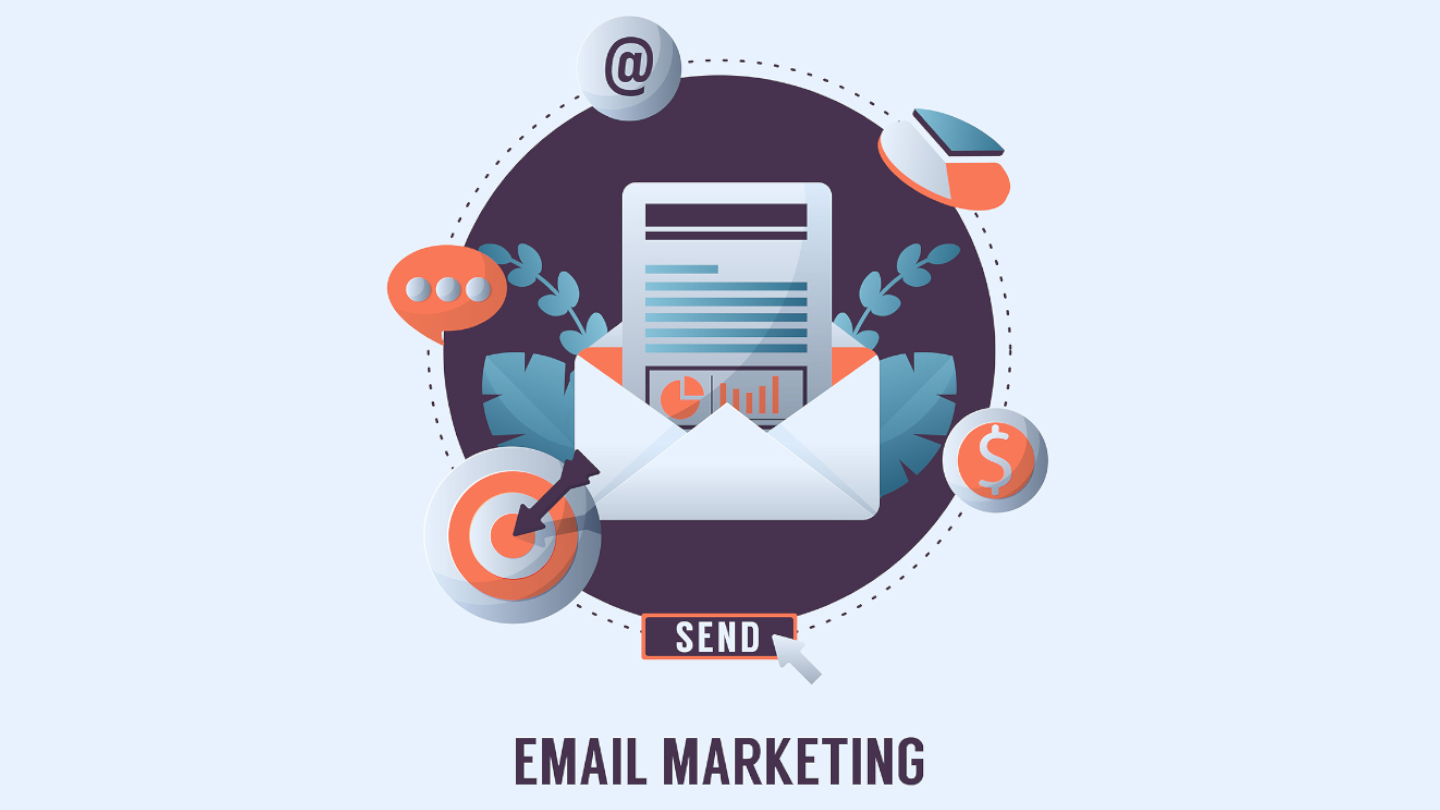AI email marketing transforms ordinary business communications into hyper-personalized customer experiences that drive unprecedented engagement and conversion rates. By harnessing machine learning algorithms, natural language processing, and behavioral analytics, these sophisticated systems predict customer needs, optimize sending times, and craft messages that resonate on an individual level. From automatically segmenting audiences based on subtle behavioral patterns to dynamically generating subject lines with proven psychological appeal, today's AI-driven email platforms represent a quantum leap from the mass-blast approaches of yesterday.
As we explore the remarkable evolution of this technology from basic automation to predictive intelligence, we'll uncover how forward-thinking businesses are leveraging these tools to forge deeper customer connections while navigating the important ethical considerations that accompany such powerful capabilities.

How Has AI Email Marketing Evolved Over Time?
The story of AI email marketing is one of remarkable transformation, beginning with basic automation and growing into sophisticated, predictive systems powered by machine learning and natural language processing. Let's journey through this evolution to understand how we arrived at today's advanced capabilities.
The Early Days: Basic Automation (1990s-2000s)
AI email marketing took its first steps in the form of simple rule-based automation. In the late 1990s, platforms like Constant Contact and Mailchimp emerged, offering basic segmentation and scheduling capabilities. These tools allowed marketers to send mass emails based on predefined rules, but lacked true intelligence or learning capabilities.
The landmark development during this period was the introduction of A/B testing, which represented the first data-driven approach to email optimization. Solutions like ExactTarget (now Salesforce Marketing Cloud) pioneered these capabilities, enabling marketers to test different subject lines or content variations against small audience samples before full deployment.
As one email marketing veteran recounted in a Brafton interview: "We weren't doing AI back then—we were just happy to get open rate data and basic click tracking."
The Middle Era: Analytics and Personalization (2010-2017)
The next significant leap in AI email marketing came with the integration of advanced analytics and personalization engines. Companies like Marketo and HubSpot introduced behavioral tracking capabilities that could monitor user interactions across websites and emails, creating more comprehensive user profiles.
This era saw the first meaningful implementation of predictive analytics in email marketing. Tools began recommending optimal send times based on historical open rates and suggesting content based on previous engagement patterns. According to a landmark 2016 study, emails with personalized subject lines generated 26% higher open rates—a finding that accelerated investment in more sophisticated personalization technology.
The Modern Era: True AI Integration (2018-Present)
The contemporary phase of AI email marketing has been defined by the integration of genuine artificial intelligence capabilities, particularly machine learning and natural language processing. This shift was catalyzed by the emergence of platforms like Phrasee, which introduced AI-generated subject lines that could outperform human copywriters in A/B tests.
Today's AI email marketing tools encompass a wide range of sophisticated capabilities:
1. Content generation: Tools like Lavender and Copy.ai can generate entire email drafts based on campaign objectives and brand voice guidelines.
2. Dynamic content optimization: Solutions such as Optimail and Movable Ink can automatically adjust content based on real-time data, including location, device, and even weather conditions.
3. Predictive analytics: Advanced algorithms now predict not just when to send emails, but which customers are most likely to convert, churn, or upgrade.
4. Sentiment analysis: AI can now analyze response patterns and customer sentiment to refine messaging approaches.
A report by Rasa.io found that 67% of marketing professionals now use some form of AI in email marketing, with adoption accelerating dramatically in the past three years. The technology has evolved from a novelty to a necessity, with companies reporting average ROI improvements of 42% after implementing AI-driven email strategies.
What Are the Strengths and Limitations of AI Email Marketing?
Understanding both the advantages and constraints of AI email marketing is essential for implementing effective strategies. Let's examine where these technologies excel and where human intervention remains necessary.
The Compelling Advantages
1. Unprecedented Personalization at Scale
The most significant advantage of AI email marketing is its ability to deliver hyper-personalized experiences to thousands or even millions of recipients simultaneously. Traditional segmentation might create 5-10 audience groups, but AI can essentially create a segment-of-one for each subscriber.
The data supports this approach: According to 1905 New Media, AI-driven personalized emails deliver 6x higher transaction rates than generic broadcasts. This effectiveness stems from AI's ability to process and act upon thousands of data points per user, creating truly tailored experiences impossible through manual methods.
2. Continuous Optimization
Unlike static campaigns, AI systems continuously learn and improve. Modern AI email marketing tools automatically adjust subject lines, content, send times, and frequency based on ongoing performance data.
3. Time Efficiency and Resource Allocation
The time-saving aspect of AI for email marketing cannot be overstated. Tasks that once required days of copywriting, design work, and manual segmentation can now be accomplished in hours or even minutes.
The Notable Limitations
Despite these impressive capabilities, AI email marketing still faces significant constraints that require human oversight and intervention.
1. Brand Voice Consistency Challenges
While AI can generate convincing copy, maintaining a consistent and authentic brand voice remains challenging. Many AI email marketing tools struggle with nuance, humor, and cultural references that human copywriters instinctively understand.
2. Contextual Understanding Gaps
AI systems can analyze vast datasets but sometimes miss crucial contextual factors. For example, an algorithm might recommend promotional language during a sensitive global event or crisis when a more empathetic approach is appropriate.
This limitation exists because AI lacks true emotional intelligence and cultural awareness—attributes that remain uniquely human despite advances in sentiment analysis.
3. Data Quality Dependencies
The effectiveness of AI in email marketing is directly proportional to the quality and quantity of data available. Organizations with limited customer data or poor data hygiene may find AI recommendations less accurate or helpful.

How Is AI Email Marketing Impacting Various Industries?
The influence of AI email marketing extends far beyond marketing departments, reshaping entire industries and creating both opportunities and challenges across sectors.
Positive Transformations
Retail and E-commerce
The retail sector has perhaps benefited most dramatically from AI email marketing, with McKinsey reporting that AI-driven product recommendations in emails generate up to 35% of e-commerce revenues for companies with mature implementations.
Fashion retailer ASOS serves as a compelling case study, using AI to analyze purchase history, browsing behavior, and even weather patterns to deliver highly personalized email content. Their AI-powered "You Might Also Like" email recommendations have increased average order value by 22% compared to generic promotional emails.
Healthcare and Wellness
In healthcare, AI email marketing has improved patient education and adherence. Healthcare providers using AI-driven email systems have reported 31% improvements in appointment attendance and 24% better medication adherence rates when communications are personalized to patient history and preferences.
Industries Facing Disruption
Traditional Marketing Agencies
Conventional marketing agencies that haven't adapted to AI capabilities face significant challenges. The solution for agencies lies in repositioning themselves as strategic partners rather than execution resources. Successful agencies are now focusing on AI implementation, strategic guidance, and creative direction while leveraging AI for production tasks.
Content Creation Professionals
Copywriters specializing in email content face obvious disruption from AI generation tools. However, the most successful professionals have adapted by developing AI prompt engineering skills and focusing on strategic oversight.
What Ethical Considerations Surround AI Email Marketing?
As AI email marketing capabilities expand, so too do the ethical questions surrounding its use. Several key concerns demand attention from industry professionals.
Privacy and Data Collection Concerns
The effectiveness of AI in email marketing depends on extensive data collection, raising significant privacy questions. While 73% of consumers appreciate personalized communications, 86% express concern about how their data is collected and used, according to a CMS Wire survey.
This tension creates a complex ethical landscape for marketers. Excessive data collection can breach trust, while insufficient personalization may result in irrelevant communications. The solution lies in transparent data practices and meaningful consent mechanisms.
Manipulation and Dark Patterns
The persuasive power of hyper-personalized AI email marketing raises concerns about manipulation. AI systems can identify and exploit psychological triggers, potentially crossing the line between persuasion and manipulation.
For example, AI can determine that a particular customer responds to scarcity messaging ("Only 2 left!") even when no actual scarcity exists. Is this clever marketing or deceptive practice? The line is often blurry.
Employment Displacement
The automation capabilities of AI email marketing tools inevitably affect employment in the sector. A 2023 industry survey found that companies using AI for email content generation employed 37% fewer copywriters compared to similar-sized competitors without AI implementation.
This displacement creates both economic and ethical questions about responsibility toward workforce transitions and reskilling initiatives.
Legal Compliance Questions
Many marketers wonder: is AI email marketing legal? While the core technology is legal, its implementation must comply with existing regulations like GDPR, CCPA, and CAN-SPAM. AI systems can sometimes make compliance more challenging by generating content or selecting audience segments that inadvertently violate regulations.
For example, an AI might identify patterns indicating a user is pregnant before they've shared this information publicly, creating potential privacy violations if this insight is explicitly referenced in communications.

How Can Humans and AI Collaborate Effectively in Email Marketing?
Rather than viewing AI as a replacement for human marketers, the most successful implementations establish collaborative relationships between human expertise and machine capabilities. Here's how to use AI for email marketing most effectively:
Establishing Appropriate Division of Labor
The most effective AI email marketing implementations clearly delineate human and AI responsibilities based on their respective strengths:
AI Responsibilities:
- Data analysis and pattern recognition
- Content variation generation and testing
- Send-time optimization
- Personalization implementation
- Performance prediction
Human Responsibilities:
- Strategic campaign planning
- Brand voice oversight
- Ethical guardrails
- Creative direction
- Emotional intelligence
Successful organizations typically establish formal review processes where AI-generated content receives human approval before deployment, ensuring quality control while maintaining efficiency.
Ethical Implementation Frameworks
To address the ethical concerns outlined earlier, I recommend implementing these specific guardrails:
1. Transparency declarations: Clearly disclose when AI has generated or influenced email content. This doesn't require technical explanations, but simple statements like "Recommendations powered by AI" maintain trust.
2. Human oversight committees: Establish cross-functional teams including legal, ethical, and customer advocacy representatives to review AI systems and outputs regularly.
3. Opt-out mechanisms: Provide clear options for customers to receive less personalized communications if they prefer, demonstrating respect for varying comfort levels with AI personalization.
4. Regular algorithm audits: Implement quarterly reviews of AI decision-making patterns to identify potential biases or problematic recommendations.
Skill Development for Collaboration
For marketing professionals wanting to excel in this new landscape, developing specific skills will enhance collaboration with AI email marketing tools:
1. Prompt engineering: Learning to provide clear, detailed instructions to AI systems is becoming a crucial skill for marketers.
2. Data literacy: Understanding data analysis fundamentals helps marketers evaluate and guide AI recommendations effectively.
3. Strategic thinking: As AI handles more tactical execution, human marketers should develop stronger strategic capabilities.
4. Ethical reasoning: Cultivating the ability to identify and address potential ethical concerns in AI applications becomes increasingly valuable.

FAQs
Q: Is AI email marketing replacing human marketers?
A: No, but it is dramatically changing their roles. Rather than replacing human marketers, AI email marketing is shifting their focus from tactical execution (writing every subject line, building every segment) to strategic direction, creative oversight, and ethical governance. The most successful organizations create collaborative human-AI workflows rather than viewing it as a replacement technology.
Q: How much does it cost to implement AI in email marketing?
A: The cost of implementing AI for email marketing varies widely based on scale and sophistication. Entry-level tools with AI capabilities like subject line optimization start around $50-100 monthly for small businesses. Enterprise-grade solutions with comprehensive AI features (content generation, dynamic personalization, predictive analytics) typically range from $2,000-10,000 monthly. Most organizations see positive ROI within 3-6 months of implementation.
Q: How will AI email marketing evolve in the next five years?
A: Over the next five years, AI email marketing will likely evolve in several key directions:
1. Multimodal understanding: AI will better comprehend and generate combinations of text, images, and potentially video content.
2. Emotional intelligence: Systems will develop more sophisticated understanding of emotional contexts and appropriate responses.
3. Cross-channel integration: Email AI will coordinate more seamlessly with other channels for truly omnichannel experiences.
4. Predictive journey mapping: AI will move beyond optimizing single emails to architecting entire customer journeys predictively.
Q: What's the best way to start using AI for email marketing?
A: For organizations just beginning with AI in email marketing, I recommend this phased approach:
1. Start with a single AI capability (like subject line optimization) rather than attempting comprehensive implementation.
2. Establish clear success metrics before implementation to measure impact.
3. Create side-by-side comparison opportunities between AI and traditional approaches.
4. Gradually expand AI responsibilities as confidence and understanding grow.
5. Invest in training for marketing teams to collaborate effectively with AI systems.
Conclusion
The rise of AI email marketing represents one of the most significant transformations in digital marketing history. From its origins in basic automation to today's sophisticated predictive systems, the technology has fundamentally changed how brands communicate with their audiences.
The advantages are compelling: unprecedented personalization, continuous optimization, and dramatic efficiency improvements. Yet important limitations remain around brand voice consistency, contextual understanding, and data dependencies that require human oversight.
As we navigate this evolving landscape, ethical considerations must remain at the forefront. Privacy concerns, potential manipulation, employment impacts, and compliance questions demand thoughtful attention from industry professionals.
The question isn't whether to adopt AI in email marketing—that train has left the station. The real question is how to implement it responsibly, strategically, and effectively. Organizations that answer this question successfully will gain significant competitive advantages while those that ignore it risk rapid obsolescence.
As we move forward, continuous learning, ethical vigilance, and creative thinking will remain the human contributions that no AI system can replace—and that will ultimately determine the success of our AI email marketing initiatives.
 Submit Your AI Tool For FREE!Showcase Your Innovation To Thousands Of AI Enthusiasts!
Submit Your AI Tool For FREE!Showcase Your Innovation To Thousands Of AI Enthusiasts! Submit Your AI Tool For FREE!Showcase Your Innovation To Thousands Of AI Enthusiasts!
Submit Your AI Tool For FREE!Showcase Your Innovation To Thousands Of AI Enthusiasts! Submit Your AI Tool For FREE!Showcase Your Innovation To Thousands Of AI Enthusiasts!
Submit Your AI Tool For FREE!Showcase Your Innovation To Thousands Of AI Enthusiasts! Submit Your AI Tool For FREE!Showcase Your Innovation To Thousands Of AI Enthusiasts!
Submit Your AI Tool For FREE!Showcase Your Innovation To Thousands Of AI Enthusiasts! Submit Your AI Tool For FREE!Showcase Your Innovation To Thousands Of AI Enthusiasts!
Submit Your AI Tool For FREE!Showcase Your Innovation To Thousands Of AI Enthusiasts!







No comments yet. Be the first to comment!